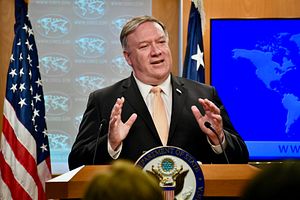Questions related to U.S. President Donald Trump’s decision to end U.S. sanction waivers on imports of Iranian oil have dominated the Chinese Foreign Ministry’s regular press briefing for three days in a row. Although obviously unhappy with Trump’s iron fist on Iran, China has remained careful with its tone, hoping not to fall out with the United States at a critical moment. The two nations are set to hold a new round of trade talks in Beijing next week.
On April 22, the White House issued a statement, announcing that the Trump administration is not going to reissue Significant Reduction Exceptions (SREs) when they expire in early May, in an attempt to “bring Iran’s oil exports to zero and deny the regime its principal source of revenue.”
Last November, the United States granted SREs to China, Greece, India, Italy, Japan, South Korea, Taiwan, and Turkey, allowing Iran’s eight biggest buyers of crude continue to purchase oil from the Islamic Republic.
The Trump administration’s latest move means that those eight buyers could face U.S. sanctions if they don’t cease importing Iran’s crude after May 1.
U.S. Secretary of State Mike Pompeo fired off a public warning at a press conference on April 22, saying that “Any nation or entity interacting with Iran should do its diligence and err on the side of caution. The risks are simply not going to be worth the benefits.”
As Iran’s largest crude oil customer, China imported around 29.3 million tons or about 585,400 barrels per day (bpd) from Iran, equivalent to 6 percent of China’s total oil imports, according to CNBC. Unsurprisingly, China is irritated by the U.S. statement. Since day one, China’s Foreign ministry spokesperson Geng Shuang has expressed China’s discontent.
On April 23, Geng protested again:
China firmly opposes the unilateral sanctions and so-called “long-arm jurisdictions” imposed by the U.S. The normal energy cooperation under the international law between Iran and other members of the international community, China included, is legitimate and lawful; thus it must be respected and protected…We urge the U.S. to act in a responsible manner and play a constructive role instead of doing the opposite.
Geng also claimed that China will “continue to uphold the lawful and legitimate rights and interests of Chinese businesses,” hinting that China might continue its business with Iran.
However, it’s worth noting that Geng remained very careful with his tone. When asked on April 24 whether China will “take retaliatory measures” against the United States, Geng refused to give a direct reply; nor did he offer any harsher criticism of the United States.
Instead, Geng immediately gave another positive reply about the upcoming new round of bilateral trade talks. He reiterated that ”substantive progress has been made in the high-level economic and trade consultations between China and the U.S. ”
“The Chinese and U.S teams, as we believe, will continue to meet each other halfway and work together for a mutually beneficial agreement,” he added.
The White House stated on April 23 that U.S. Trade Representative Robert Lighthizer and Secretary of the Treasury Steven Mnuchin will travel to Beijing for a new round of talks with their Chinaese counterpart Liu He on April 30. Liu will then lead a Chinese delegation to Washington for additional discussions starting on May 8.
It’s apparent that Beijing’s top priority is securing a trade deal with Washington rather than dealing with the issue of Iran or any other rifts with the United States.
































